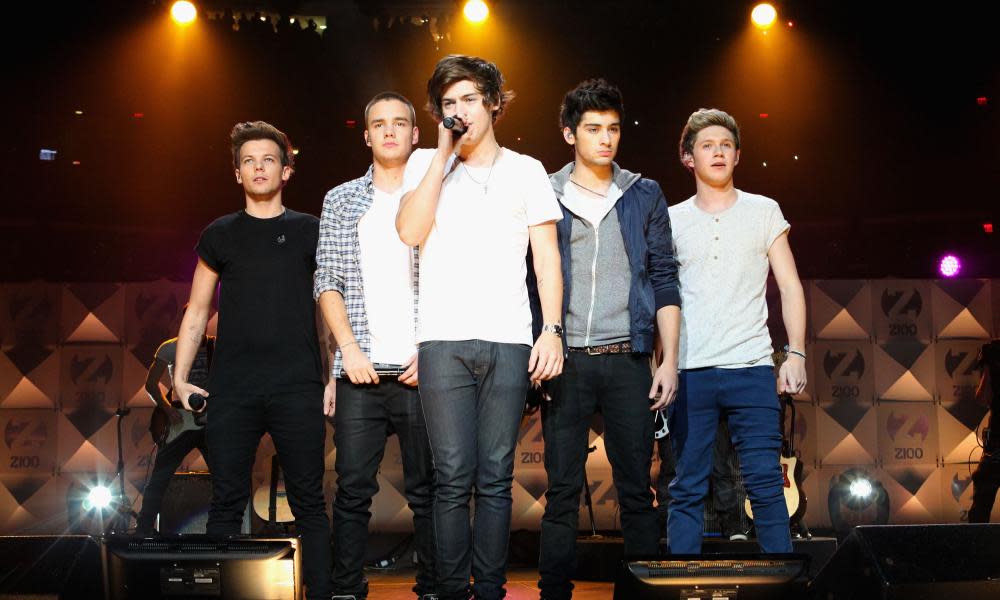How I fell in love with One Direction

The headline of this piece is almost a lie, because the way I became a fan of One Direction is far less interesting than the way that fandom nourished and sustained me in the years that followed.
It’s possible that the global obsession with the band passed you by in recent years. So first, some context: the five members of One Direction auditioned separately for the UK reality show X Factor in 2010. Unsuccessful as individuals, Harry Styles, Zayn Malik, Niall Horan, Louis Tomlinson and Liam Payne were assembled into a band under the watchful eye of pop savant Simon Cowell and almost immediately began cultivating an intensely passionate global army of fans.
The following year, their debut record Up All Night was released and would go on to sell 4.5m copies. Four more records followed before Malik called it quits in 2015. The remaining four members announced the band would go on indefinite hiatus following the release of their fifth record, Made in the AM. Since then, Styles and Horan have enjoyed success with their popular solo records and subsequent world tours, while Payne and Tomlinson have each racked up a string of collaborations with pop, hip-hop and EDM artists. Malik’s second solo record, Icarus Falls, dropped last month.
But those are just facts. And experiencing One Direction through their most active years was almost entirely reliant on feelings. It was emotional, not logical; instinctual and kind of accidental.
Investigating my relationship to One Direction means reconnecting with the purity of my love for something
Falling as deep and heavily into the One Direction fandom was a total surprise to me, especially considering it came after close to a decade of projecting an image of myself as a teenager and young adult who grasped at the threads of legitimacy by listing only punk bands in my interests on MySpace and exchanging recommendations for indie records with friends I made on early internet forums. Actively rejecting what I thought was empty and shallow pop music gave me the sense that I was somehow better and more informed than the people who embraced it. Not to sound like the narrator in a dramatic biopic, but that all changed one night with a recommendation from a friend who insisted I had to watch One Direction’s video for their debut single, What Makes You Beautiful.
Initially hesitant to what I assumed was a troupe of floppy-haired teens who looked as if they’d been designed in a lab by scientists to appeal to girls their age and younger, I soon become strangely fascinated by not only the band, but the peculiarities of each individual member, the specific dynamics that existed between them, and the millions of fans who felt the same way.
At the time I was 22, working as an editor in New York City and about to start an unknown new chapter in my life back home in Australia. The years that followed became informed by my embrace of One Direction, and the freedom my fandom gave me to love elements of pop culture based on the joy they brought me rather than the credibility I thought I’d be awarded for wearing my fandom like a badge on my chest.
My relationship to the band coincided almost perfectly with my career as a writer, to the point where I now can’t possibly imagine what my life would be like if I hadn’t been introduced to One Direction. Over the last few years, I wrote about niche movements within the fandom, reviewed the bands’ records and interviewed their long-term stylist in the lobby of a hotel swarming with my fellow obsessive fans. I first wrote about them in my final post as editor of a website, and years later I would write about them in my first book after they announced their hiatus. I dreamed of getting the chance to profile the band members themselves, while also understanding that an injection of reality like that could easily shatter the vast and rewarding relationship I had with them from afar.
At this point, almost seven years into it, I’ve written about them and their fans and their music and their mythology so many times that I’ve often declared (to myself) that I’ve nothing left to say, that it’s time to hang up my proverbial hat and move on. But any time I’m asked to dive back in – as I was for this piece – I do so with relish. Because even though I’m now revisiting it in hindsight, investigating my relationship to One Direction means reconnecting with the purity of my love for something.
I was recently reminded of a line the character Donald Kaufman says in Spike Jonze’s film Adaptation: “You are what you love, not what loves you. That’s what I decided a long time ago.”
Giving myself permission to love a pop band so intensely and obsessively meant also being willing to sacrifice some vague idea of coolness and legitimacy. Learning to surrender to a melody and contribute to the wall of sound produced by thousand of girls screaming inside an arena, to open myself up to joy without inhibition or self-criticism taught me who I was. One Direction are a band but they’re also an avatar for my biggest and most intense emotions. Oh, and the music’s really good too.

 Yahoo News
Yahoo News 
